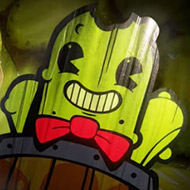Pikabuu: STOP challenges players with fast-paced decision-making and quick reflexes. The central mechanic revolves around movement and timing, requiring you to stop at the right moment to avoid traps, bypass enemies, or survive sudden environmental hazards. Unlike traditional exploration-based titles, this experience pushes players to master timing and precision.
The Core Mechanic
The foundation of Pikabuu: STOP lies in controlling when to move and when to freeze. Every action carries consequences, as one step too far or one second too late may trigger failure. This simple concept becomes complex as new layers of difficulty are introduced with each stage.
- Moving platforms – stop too soon, and you fall short; stop too late, and you fall off.
- Enemy patrols – timing stops helps you slip past unnoticed.
- Traps – spikes, falling blocks, and lasers activate when movement is detected.
- Timed doors – force players to calculate the exact moment to freeze.
Levels and Escalating Difficulty
Pikabuu: STOP introduces new obstacles gradually, giving players time to adapt while still increasing the challenge. Early levels focus on simple stop-and-go actions, but later stages demand sharper reflexes and planning. Some levels combine multiple hazards at once, requiring quick thinking and flawless execution.
- Introductory stages – practice timing with simple obstacles.
- Intermediate zones – introduce traps and enemy patrols.
- Advanced layers – combine movement-based puzzles with unpredictable hazards.
- Final challenges – demand mastery of all mechanics under strict timing.
Replayability and Strategy
Although the concept seems straightforward, the variety of traps and obstacles makes each playthrough unique. Players often experiment with different timing strategies to optimize progress. Some levels allow multiple solutions, such as sprinting through danger with perfect timing or progressing carefully with calculated stops.
The game also rewards persistence. Failure is not final but instead part of the learning process. Each mistake highlights where timing went wrong, encouraging players to refine their strategies for the next attempt. This loop of trial, error, and mastery provides long-term replay value.
What Makes It Stand Out
Pikabuu: STOP succeeds because of its simple but demanding mechanic. It takes an idea that seems easy—knowing when to stop—and builds it into a layered challenge that keeps players engaged. The escalating difficulty ensures constant growth, while the satisfaction of clearing a tough stage makes progress rewarding.
In summary, Pikabuu: STOP offers a test of precision and timing where mistakes are costly but victories feel earned. It appeals to players who enjoy reflex-based challenges and games that push them to master mechanics through practice and persistence.














 Fullscreen
Fullscreen














